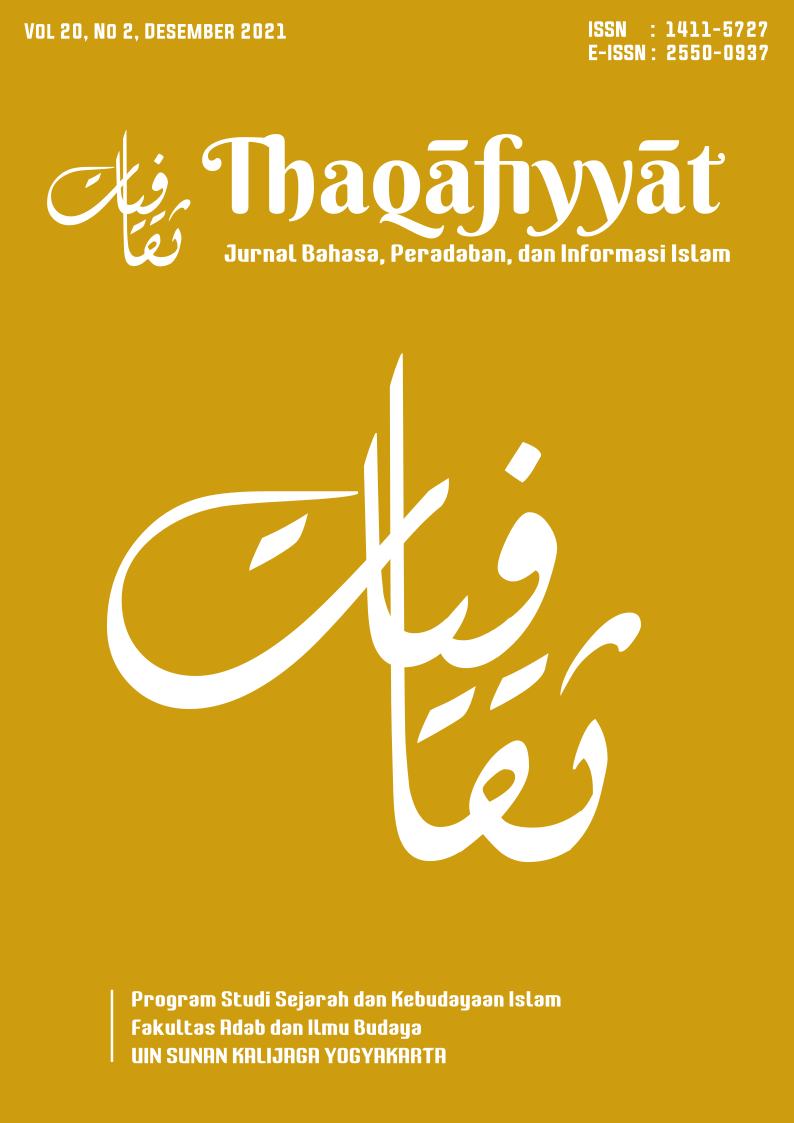KATOBA IN MUNA SOCIETY
DOI:
https://doi.org/10.14421/thaq.2021.20203Keywords:
Katoba, Muna Society, CultureAbstract
Abstract: Katoba is one tradition of the Muna Community. It still preserved and practiced. Especially in Muna society, it has been adapted into Islam practice. This study Aimed to know how katoba are believed and practiced and then become one of a religious creed which, originally is not purely derived from Islamic teaching. This study used a case study. Islam has Universalism concept that is able to converge and fuse with various civilizations and culture, this makes Islam accepted in many nations and civilizations. Muna people believe that katoba is one of the rituals associated with religious belief. Because it is consist of several religious values which must be executed, such as 2 (two) aspects as follow: firstly; the Actor of katoba should have a good understanding of the religion. Secondly, the moment to do katoba is when the children become approaching puberty (6-12 age). Katoba is considered to be closely related to Islam, so it becomes a public belief.
Abstrak: Katoba merupakan salah satu tradisi masyarakat Muna yang masih dilestarikan dan dipraktikkan, khususnya di masyarakat Muna, telah diadaptasi ke dalam praktik Islam. Kajian ini bertujuan untuk mengetahui bagaimana katoba diyakini dan diamalkan kemudian menjadi salah satu akidah agama yang semula tidak murni bersumber dari ajaran Islam. Penelitian ini menggunakan studi kasus. Islam memiliki konsep Universalisme yang mampu menyatu dan melebur dengan berbagai peradaban dan budaya, hal ini membuat Islam diterima di banyak bangsa dan peradaban. Orang Muna percaya bahwa katoba adalah salah satu ritual yang terkait dengan kepercayaan agama. Karena didalamnya terkandung beberapa nilai religi yang harus dijalankan, seperti 2 (dua) aspek sebagai berikut: pertama; Pelaku katoba harus memiliki pemahaman yang baik tentang agama. Kedua, saat melakukan katoba adalah saat anak mendekati pubertas (6-12 tahun). Katoba dianggap sangat erat kaitannya dengan Islam, sehingga menjadi kepercayaan masyarakat.
Downloads
References
Aida, Hayani, and Daud Al-Kahar Aris Armeth. “Problematic of Katoba Tradition: Study of Islamic Ritual in Muna Communities.” Journal of Islamic Studies and Humanities 5. 1 (2020).
H., Hadi. “Tradisi Katoba Sebagai Media Komunikasi Tradisional Dalam Masyarakat Muna (Perspektif Komunikasi Ritual).” Jurnal Penelitian Komunikasi dan Opini Publik (2016).
Hadirman. “Katoba Tradition as Traditional Medoa Communications In the Community Muna.” Jurnal Penelitian Komunikasi dan Opini Publik 20. 1 (August 2016).
———. “Sejarah Dan Bahasa Figuratif Dalam Tradisi Katoba Pada Masyarakat Muna.” Jurnal AQLAM-Journal of Islam and Plurarity 2. 1 (June 2017).
Hardi, and Siti Herma. “Religious Study of Katoba Traditions and Its Function in Character Building of Muna Society” Presented at the IOS Conf. Science Earth and Enviromental Science, 2018.
Hardin. “Ritual Katoba Sebagai Produk Dan Praktek Budaya Islam Yang Mencerminkan Seperangkat Norma Dan Nilai Sosial - Budaya Bagi Masyarakat Etnik Muna” Presented at the The National Student Writing Competition, Makassar, March 2008.
Jaya. “Tradisi Dan Ritual Dalam Masyarakat Muna.” Http://Www.Munaraya.Com.
Karmini, ed. Mengurai Tradisi Lisan Merajut Pendidikan Karakter. Denpasar: Cakra Press, 2013.
La Fua, Jumarddin. “Etnopedagogi Katoba Sebagai Bentuk Pendidikan Karakter Dan Pendidikan Lingkungan Hidup Pada Etnis Muna.” Zawiyah Jurnal Pemikiran Islam 1. 1 (December 2015).
La, Niampe. “Tuturan Tentang Katoba Dalam Tradisi Lisan Muna” Presented at the International Seminar, Wakatobi, Southeast Sulawesi, December 1, 2008.
Marzuki. “Tradisi Peusijuek Dalam Masayrakat Aceh.” Journal El-Harakah 2. 1 (June 2014).
Zainal, Asliah. “Menjadi Muslim Muna; Katoba, Proses Reproduksi Identitas Dalam Masyarakat Muna.” Gadjah Mada University, 2015.
Downloads
Published
Issue
Section
License
Copyright (c) 2022 Aida Hayani

This work is licensed under a Creative Commons Attribution-NonCommercial-ShareAlike 4.0 International License.
Authors who will publish with this journal agree to the following terms:
- Thaqafiyyat: Jurnal Bahasa, Peradaban dan Informasi Islam publishes all articles entirely in full text.
- It is permissible for readers to download and to use it for scientific purposes and scientific dissemination.
- Authors retain copyright and grant the journal right of first publication with the work simultaneously licensed under a Creative Commons Attribution License that allows others to share the work with an acknowledgement of the work's authorship and initial publication in this journal.
- Authors are able to enter into separate, additional contractual arrangements for the non-exclusive distribution of the journal's published version of the work (e.g., post it to an institutional repository or publish it in a book), with an acknowledgement of its initial publication in this journal.
- Authors are permitted and encouraged to post their work online (e.g., in institutional repositories or on their website) prior to and during the submission process, as it can lead to productive exchanges, as well as earlier and greater citation of published work.









